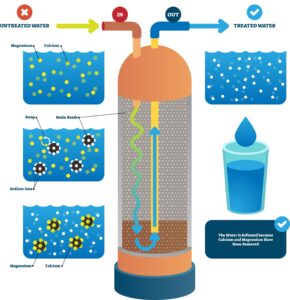Did you know that Gainesville’s hard water can wreak more havoc on your home than a gator in a kiddie pool? So how does one know which are the best water softeners to use? According to local water reports, our area’s water hardness averages between 10-15 grains per gallon – that’s enough to turn your appliances into limescale magnets and your skin into a dry, itchy mess.
The Best Water Softeners Are a Big Deal in Florida
Listen up, y’all. Hard water isn’t just an annoyance – it’s a full-blown home invasion. Here’s why you need to care:
- Appliances die faster than mosquitos in winter
- Your energy bills can skyrocket due to mineral buildup
- Skin and hair look more parched than our summer lawns
Understanding Water Hardness: More Than Just H2O
Water hardness is basically a mineral party in your pipes. Calcium and magnesium are the uninvited guests that cause:
- Soap scum that never seems to disappear
- Crusty faucets that look older than UF’s oldest building
- Clothes that feel like they’ve been washed in sandpaper
Sizing Up The Best Water Softeners: What Works for Gainesville Homes
When choosing a water softener, think about:
- Household size
- Daily water consumption
- Specific water hardness level
Pro tip: A family of four in a typical Gainesville home usually needs a system that can handle 30,000-40,000 grain capacity.
Choose From The Best Water Softeners: Picking Your Water-Battling Weapon
Salt-Based Softeners
The classic choice. Think of it like picking a reliable pickup truck – gets the job done every time.
Salt-Free Conditioners
More like a hybrid vehicle. Less maintenance, but might not pack the same punch against hardcore minerals.
Dual-Tank Systems
For the overachievers who never want to run out of soft water. Perfect for large families or homes with high water demands.
Installation Considerations: DIY or Call the Pros?
While we Floridians love a good DIY project, water softener installation can be trickier than navigating I-75 during springtime traffic. Unless you’re super handy, consider professional installation from local experts like the team at Gainesville Benjamin Franklin Plumbing.
Maintenance: Keeping Your Water Softener Happy
- Check salt levels monthly
- Clean the brine tank annually
- Schedule professional inspections
The Bottom Line
A good water softener is like a loyal friend – it protects your home, saves you money, and makes life just a little bit easier. So make sure you know which ones are the best water softeners when making your decision. Don’t let hard water turn your Gainesville home into a mineral nightmare!
Ready to Upgrade Your Water?
Contact the pros at Gainesville Benjamin Franklin Plumbing for a free consultation on giving you a water softener installation. Your appliances (and skin) will thank you!
improvement.
Choosing Between The Best Water Softeners: FAQ
What factors should I consider when choosing the best water softeners?
When choosing a water softener, consider factors like household size, water hardness level, and system type (salt-based vs. salt-free). Additionally, the softener’s capacity, maintenance requirements, and energy efficiency should be considered to ensure it meets your needs.
How do I determine the water hardness level in my home?
You can determine water hardness by using a water hardness test kit, which is available at most hardware stores, or by checking with your local water supplier. Hardness is typically measured in grains per gallon (GPG), with higher numbers indicating harder water.
What is the difference between salt-based and salt-free water softeners?
Salt-based systems use sodium to remove calcium and magnesium from water, making them highly effective at softening. Salt-free systems, on the other hand, use alternative methods like potassium or other technologies, and are maintenance-free and more environmentally friendly, but less effective in very hard water conditions.
How do I know what size water softener I need?
To determine the right size, consider your household’s water usage and the hardness level of your water. A general guideline is to choose a system that can handle 30-40 gallons per person per day, accounting for the level of hardness in your water.
Are water softeners difficult to install?
While some water softeners are designed for DIY installation, it’s recommended to hire a professional to ensure proper setup. Improper installation can damage your plumbing, so expert installation ensures that everything runs smoothly and efficiently.
How often do I need to maintain my water softener?
Maintenance typically involves adding salt for salt-based systems, cleaning the resin tank, and inspecting for clogs or leaks. It’s best to perform maintenance every 2-6 months, depending on your water usage and the specific system requirements.
Can a water softener improve the taste and odor of my water?
Yes, by removing excess minerals like calcium and magnesium, water softeners can help reduce the mineral taste and odor in your water. However, if you experience chlorine taste or other issues, you may need an additional filtration system.
Are there eco-friendly water softeners available?
Yes, salt-free systems are considered more eco-friendly as they don’t use salt, reducing wastewater from salt discharge. Additionally, these systems require less maintenance and have less impact on the environment compared to traditional salt-based models.
What is the lifespan of a water softener?
A well-maintained water softener typically lasts 10-15 years. Regular servicing and maintaining the system, like replenishing salt and cleaning components, can extend the life of your water softener.
How much does a water softener cost?
The cost of water softeners varies depending on the type, capacity, and installation requirements. On average, you can expect to pay between $400 to $2,500, including installation. Ongoing costs for salt and maintenance should also be factored into your overall budget.